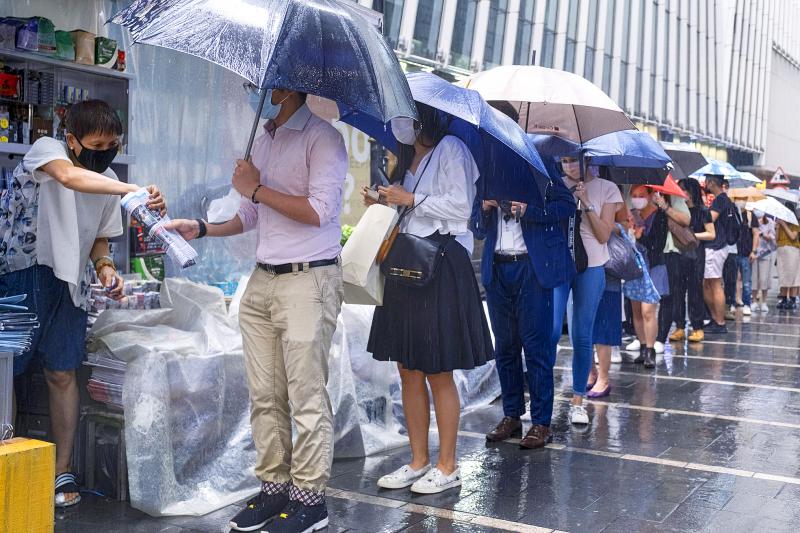The final edition of Hong Kong’s last remaining pro-democracy newspaper sold out within hours yesterday, as readers scooped up all 1 million copies of the Apple Daily, whose closure was yet another sign of China’s tightening grip on the territory.
People lined up early in the morning to buy the paper, which in the past few years has become an increasingly outspoken critic of Chinese and Hong Kong authorities’ efforts to limit freedoms in the territory. The paper was gone from newsstands by 8:30am.
The swansong front page featured the paper’s own journalists waving goodbye to crowds outside its headquarters.

Photo: AFP
“Apple Daily is dead,” deputy chief editor Chan Pui-man (陳沛敏), who was arrested last week on a national security charge, wrote in a farewell letter to readers.
“Press freedom became the victim of tyranny,” he added.
The newspaper said it was forced to cease operations after police froze US$2.3 million of its assets, searched its office and arrested five top editors and executives last week, accusing them of foreign collusion to endanger national security.

Photo: Bloomberg
“This is our last day, and last edition. Does this reflect the reality that Hong Kong has started to lose its press freedom and freedom of speech?” an Apple Daily graphic designer, Dickson Ng, asked. “Why does it have to end up like this?”
The paper printed 1 million copies for its final edition — up from the usual 80,000. While pro-democracy media outlets still exist online, it was the only print newspaper of its kind left in Hong Kong.
In the working-class district of Mongkok, hundreds lined up through the early hours of the morning to get their hands on the final edition, some chanting: “Apple Daily we will meet again.”
“It’s very shocking,” said a 30-year-old woman, who was in the line and gave her first name as Candy. “Within two weeks, authorities could use this National Security Law to dismantle a listed company.”
On Wednesday night, more than 100 people stood outside Apple Daily’s office building in the rain to show their support, taking photographs and shouting words of encouragement.
Inside the building, Chan told staff who gathered around the newsroom to big applause: “You’ve done a great job, everyone.”
In Taipei, the Mainland Affairs Council said the paper’s demise was “sounding the death knell” for media freedom in Hong Kong.
“This shows the international community that the Chinese Communist Party, in its exercise of totalitarian political power, will stop at nothing to use extreme means to wipe out dissenting opinions,” it said in an e-mailed statement. “Humankind’s quest for freedom, democracy and other universal values will not be lost to history, but history will remember the ugly face of the power behind the suppression of freedom.”
Apple Daily’s closure marks a “dark day for press freedom in Hong Kong,” said Thomas Kellogg, executive director of the Georgetown Center for Asian Law.
“Without Apple Daily, Hong Kong is less free than it was a week ago. Apple Daily was an important voice, and it seems unlikely that any other media outlet will be able to fill its shoes, given growing restrictions on free speech and freedom of the press,” he said.
The Taiwanese edition of the Apple Daily, which is now only available online, assured readers that its operations would continue.

TRAGEDY STRIKES TAIPEI: The suspect died after falling off a building after he threw smoke grenades into Taipei Main Station and went on a killing spree in Zhongshan A 27-year-old suspect allegedly threw smoke grenades in Taipei Main Station and then proceeded to Zhongshan MRT Station in a random killing spree that resulted in the death of the suspect and two other civilians, and seven injured, including one in critical condition, as of press time last night. The suspect, identified as a man surnamed Chang Wen (張文), allegedly began the attack at Taipei Main Station, the Taipei Fire Department said, adding that it received a report at 5:24pm that smoke grenades had been thrown in the station. One man in his 50s was rushed to hospital after a cardiac arrest

SAFETY FIRST: Double the number of police were deployed at the Taipei Marathon, while other cities released plans to bolster public event safety Authorities across Taiwan have stepped up security measures ahead of Christmas and New Year events, following a knife and smoke bomb attack in Taipei on Friday that left four people dead and 11 injured. In a bid to prevent potential copycat incidents, police deployments have been expanded for large gatherings, transport hubs, and other crowded public spaces, according to official statements from police and city authorities. Taipei Mayor Chiang Wan-an (蔣萬安) said the city has “comprehensively raised security readiness” in crowded areas, increased police deployments with armed officers, and intensified patrols during weekends and nighttime hours. For large-scale events, security checkpoints and explosives

A car bomb killed a senior Russian general in southern Moscow yesterday morning, the latest high-profile army figure to be blown up in a blast that came just hours after Russian and Ukrainian delegates held separate talks in Miami on a plan to end the war. Kyiv has not commented on the incident, but Russian investigators said they were probing whether the blast was “linked” to “Ukrainian special forces.” The attack was similar to other assassinations of generals and pro-war figures that have either been claimed, or are widely believed to have been orchestrated, by Ukraine. Russian Lieutenant General Fanil Sarvarov, 56, head

PUBLIC SAFETY: The premier said that security would be tightened in transport hubs, while President Lai commended the public for their bravery The government is to deploy more police, including rapid response units, in crowded public areas to ensure a swift response to any threats, President William Lai (賴清德) said yesterday after a knife attack killed three people and injured 11 in Taipei the previous day. Lai made the remarks following a briefing by the National Police Agency on the progress of the investigation, saying that the attack underscored the importance of cooperation in public security between the central and local governments. The attack unfolded in the early evening on Friday around Taipei Main Station’s M7 exit and later near the Taipei MRT’s Zhongshan